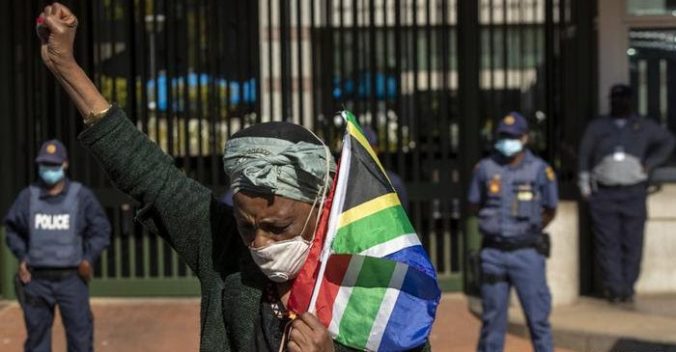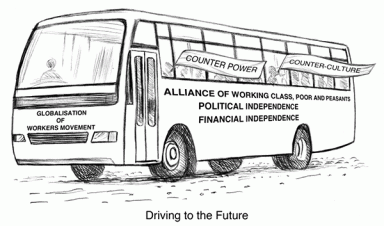 Centred on the Congress of South African Trade Unions (COSATU), and within it, key unions like the National Union of Metalworkers of South Africa (NUMSA), the unions developed an ideological and strategic orientation described by scholars (e.g. Eddie Webster and Glenn Adler, 2000) as “radical reform” or “structural reform.” The thinking of the main unions in South Africa remains, to this day, profoundly shaped by the “radical reform” (RR) model.
Centred on the Congress of South African Trade Unions (COSATU), and within it, key unions like the National Union of Metalworkers of South Africa (NUMSA), the unions developed an ideological and strategic orientation described by scholars (e.g. Eddie Webster and Glenn Adler, 2000) as “radical reform” or “structural reform.” The thinking of the main unions in South Africa remains, to this day, profoundly shaped by the “radical reform” (RR) model.
The aim of this input is to examine the RR model, which was an attempt to build on the many key progressive gains won by workers and their organisations through struggle in the 1980s, and push through to a deeper transformation in the 1990s. This input defines the key components of RR, and then examines why this innovative response to the parliamentary transition and to capitalist globalisation was not successful. This requires looking at issues of neoliberal capitalist and state domination, the impact of RR on the unions, and the effects of the institutionalisation of trade union activity and dispute processes that have taken place. It raises deeper questions about the unions’ politics as well.
Download PDF here

 In the midst of the COVID-19 pandemic, it often seems as if we are stuck in a dystopian movie. In this movie death is stalking us, hospitals overflow with the sick and dying, and the grave diggers are at work. We know more victims will soon die as the folly of millions of workers being forced by circumstances to return into cramped mines, banks, factories and warehouses is so evident. Those that are no longer needed by the billionaires who own the companies are marshalled daily by the police and military dishing out violence and on occasion, humiliation, to underline their power and the power of their bosses.
In the midst of the COVID-19 pandemic, it often seems as if we are stuck in a dystopian movie. In this movie death is stalking us, hospitals overflow with the sick and dying, and the grave diggers are at work. We know more victims will soon die as the folly of millions of workers being forced by circumstances to return into cramped mines, banks, factories and warehouses is so evident. Those that are no longer needed by the billionaires who own the companies are marshalled daily by the police and military dishing out violence and on occasion, humiliation, to underline their power and the power of their bosses. (International anarchist statement)
(International anarchist statement) The ongoing capitalist crisis, and the impacts of COVID19, have made it clear that the capitalist and state system we live under is neither efficient nor just. Inequality has hit record levels and a small elite has more wealth than ever, while the very basics – such as a decent healthcare, water, housing, sanitation, food and electricity – cannot be effectively financed, run nor delivered. Politicians in every state abuse their power too and corruption is rife, only its severity varies. Parliamentary democracy is largely hollow with a majority of people having no real political power. The oppression of women and people of colour continues unabated and imperialism deepens everyday. Due to the ever-expanding nature of capitalism the ecology is on the verge of collapse. It is clear a movement for change and an alternative to capitalism and the state system is needed.
The ongoing capitalist crisis, and the impacts of COVID19, have made it clear that the capitalist and state system we live under is neither efficient nor just. Inequality has hit record levels and a small elite has more wealth than ever, while the very basics – such as a decent healthcare, water, housing, sanitation, food and electricity – cannot be effectively financed, run nor delivered. Politicians in every state abuse their power too and corruption is rife, only its severity varies. Parliamentary democracy is largely hollow with a majority of people having no real political power. The oppression of women and people of colour continues unabated and imperialism deepens everyday. Due to the ever-expanding nature of capitalism the ecology is on the verge of collapse. It is clear a movement for change and an alternative to capitalism and the state system is needed. Over the past 18 months Zabalaza Books has published over two dozen new publications or new editions of previous publications, all of which can be read online or downloaded in PDF format from the
Over the past 18 months Zabalaza Books has published over two dozen new publications or new editions of previous publications, all of which can be read online or downloaded in PDF format from the 
 We repudiate the cowardly murder of George Floyd at the hands of Minneapolis’s police officers, another racist act in the heart of a world imperialist power. This event is added to the countless number of killings of people of colour and the Afro-descendent population in the United States which has been perpetuated since the days of slavery and hasn’t yet stopped.
We repudiate the cowardly murder of George Floyd at the hands of Minneapolis’s police officers, another racist act in the heart of a world imperialist power. This event is added to the countless number of killings of people of colour and the Afro-descendent population in the United States which has been perpetuated since the days of slavery and hasn’t yet stopped.
 The crisis of the statist politics that dominated working-class politics — social democracy, Marxism-Leninism, and anti-imperialist nationalism — and the rise of neoliberalism, has aided the rediscovery of society-centred, anti-capitalist forms of bottom-up change “at a distance” from the state.
The crisis of the statist politics that dominated working-class politics — social democracy, Marxism-Leninism, and anti-imperialist nationalism — and the rise of neoliberalism, has aided the rediscovery of society-centred, anti-capitalist forms of bottom-up change “at a distance” from the state.